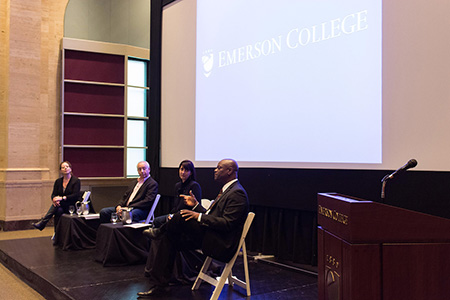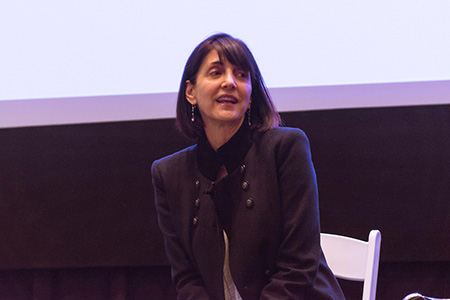Student artists warned about piracy

Linda Reisman, faculty member in Visual and Media Arts; entertainment lawyer Daniel H. Black, P ’07, chair of the Emerson Board of Overseers; Ruth Vitale of CreativeFuture; and Prince Charles Alexander of Berklee College of Music discuss Internet piracy of music and movies at Bordy Theater on October 28. (Photo by Michelle Kwong ’15)
Entertainment industry experts who participated on October 28 in an Emerson panel discussion, “Stealing Your Creative Future,” were in strong agreement that Internet piracy is an overwhelming problem for artists.
“There’s a war between Hollywood and Silicon Valley, and it’s bigger than you might think,” said panelist Prince Charles Alexander, professor at Berklee College of Music and longtime musician and producer, who has worked with big-name artists such as Notorious B.I.G., Aretha Franklin, and Mary J. Blige.
Moderated by Emerson Board of Overseers Chair and entertainment lawyer Daniel H. Black, P ’07, the discussion included an impassioned plea by Ruth Vitale, executive director of CreativeFuture, for Emerson students to understand that illegally downloading music and movies seriously hurts their ability to reach their potential as artists.
“It’s not just two kids in a basement saying, ‘Screw the man,’” Vitale said. “This is a criminal enterprise.”

Ruth Vitale, executive director of CreativeFuture, and organization dedicated to fighting Internet piracy of movies and music. (Photo by Michelle Kwong ’15)
Vitale said she has spoken to several young filmmakers whose independent films were pirated before they had a chance to shop them around—devaluing their work before it was released. She told students in the audience to always password-protect films on Vimeo and other websites, and to be extremely careful about whom they share their films with.
“Piracy is really hurting our ability as producers and filmmakers to get our movies financed,” said panelist Linda Reisman, senior distinguished producer-in-residence in Visual and Media Arts at Emerson. “When a director is looking to get his or her next film financed, financiers are asking, ‘What did your last film make?’ The box office revenue…is not going to reflect what the illegal numbers are.”
Vitale unleashed a torrent of statistics showing the harm that Internet piracy has had on the entertainment industry, which are found in this fact sheet on the CreativeFuture website.
Sales from illegal downloading and streaming of films worldwide often meet or out-pace legitimate sales, according to CreativeFuture.
In many cases, illegal sites have more traffic and unique visitors than legal sites. One illegal site, Pirate Bay, receives 60 million unique visitors every month, which is more than the websites for ABC, CBS, NBC, and Fox combined, according to CreativeFuture.
A recent sample survey of 600 for-profit pirate sites shows they took in $227 million in annual advertising revenue, including from major brands, with profit margins of 80 to 94 percent, CreativeFuture said.
“Every project,” Black said, directing his comments toward student filmmakers and artists, “some of which you’ve created, some of which are not yet on your radar, can be cannibalized, and can be co-opted by people who are going to make money on you, and you won’t. That to me…is outrageous. It would drive me crazy.”
Categories